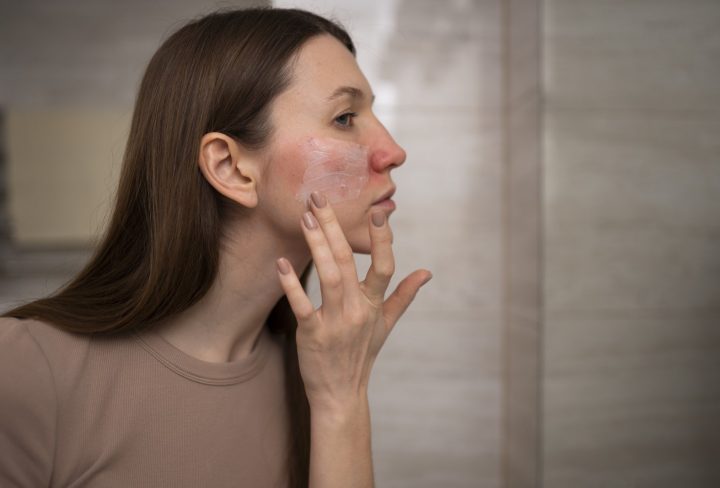Living with rosacea can sometimes feel like riding a rollercoaster. You might have clear skin one day, only to experience an unexpected flare-up the next. Learning how to identify and minimize your rosacea triggers is crucial for managing symptoms effectively. By understanding what aggravates your skin, you can take steps to prevent flare-ups and maintain a smoother complexion.
Understand and Identify Rosacea and Its Main Triggers
Rosacea Overview and Impact
Rosacea is a common skin condition, usually appearing on the face, causing redness and visible blood vessels. While anyone can get it, fair-skinned people between 30 and 50 are more susceptible. This condition can affect self-esteem and confidence due to its noticeable appearance.
People living with rosacea often feel embarrassment due to the visible symptoms. These emotions can worsen the condition, creating a difficult cycle to break. The good news is understanding common rosacea triggers helps in reducing episodes.
Identifying Common Rosacea Triggers
Certain factors, known as environmental rosacea triggers, can exacerbate the condition. Here’s a list of elements to watch for:
- Sun exposure and rosacea: Direct sunlight is a significant trigger; always remember sunscreen.
- Stress-induced rosacea: Stress can lead to flare-ups, so managing stress is essential.
- Rosacea and alcohol: Alcohol, especially red wine, is known to trigger symptoms.
- Spicy foods can also irritate the skin.
Recognizing these factors is a significant step towards rosacea flare-up prevention.
Recognizing Personal Rosacea Triggers
Not everyone reacts the same way to the same triggers. Keeping a symptom journal helps you track reactions and identifying rosacea triggers unique to you. Note the foods you eat, the weather, or stressful events. This way, tailoring your care routine becomes easier, helping you manage your rosacea better.
Diet and Skincare: Pathways to Rosacea Management
The Role of Diet in Rosacea Management
What you eat greatly impacts your skin condition. Some foods may increase flare-ups, so consider the following adjustments:
- Avoid consuming spicy foods and hot drinks.
- Incorporate anti-inflammatory foods like fish, green leafy vegetables, and berries.
These dietary choices may not cure rosacea but can lessen the chances of a flare-up.
Effective Skincare Routines
Skincare routines also play a crucial role in managing rosacea. Consider these tips:
- Use gentle cleansers: Harsh facial cleansers can irritate sensitive skin. Opt for mild, hypoallergenic products.
- Choose moisturizing products suitable for sensitive skin.
Protecting your skin from environmental rosacea triggers, including pollution, is equally important. Consider wearing a wide-brimmed hat and applying adequate sunscreen daily to shield against sun exposure and rosacea. If pollution levels are high, shield your face with a scarf or mask.
Current Treatments and Seasonal Considerations for Rosacea
Latest in Rosacea Treatments
Various treatments are available today:
- Topical creams: Help reduce redness by constricting blood vessels in the skin.
- Oral antibiotics: Manage inflammation that contributes to rosacea.
Doctors may recommend laser therapy to reduce visible blood vessels as well. Discuss with your dermatologist about identifying rosacea triggers and what treatment fits your needs.
Seasonal Variations in Rosacea
Different seasons can trigger varied symptoms. In India, the monsoon season with its humidity can make rosacea worse. During summers, the hot weather can exacerbate symptoms due to increased sun exposure and rosacea. Adapt your skincare regimen to these changes:
- During hot weather, keep your skin cool and hydrated.
- Winter requires more moisturizing, as cold air can strip moisture.
Understanding seasonal rosacea triggers and adjusting your routine can help manage symptoms throughout the year.
Concluding Thoughts on Managing Rosacea
Summation of Key Points
Learning about how to identify and minimize your rosacea triggers is empowering. Recognizing common rosacea triggers and tailoring skincare routines makes a difference in managing symptoms. Remember to maintain a balanced diet and adopt gentle skincare practices.
Inspiration for Action
Engage in a healthier lifestyle and seek professional guidance when required. Awareness and action can lead to better skin days. Start your journey toward rosacea management today by observing how your skin reacts and adjusting your habits based on those observations. Professional help remains invaluable in navigating specific and stress-induced rosacea challenges.

